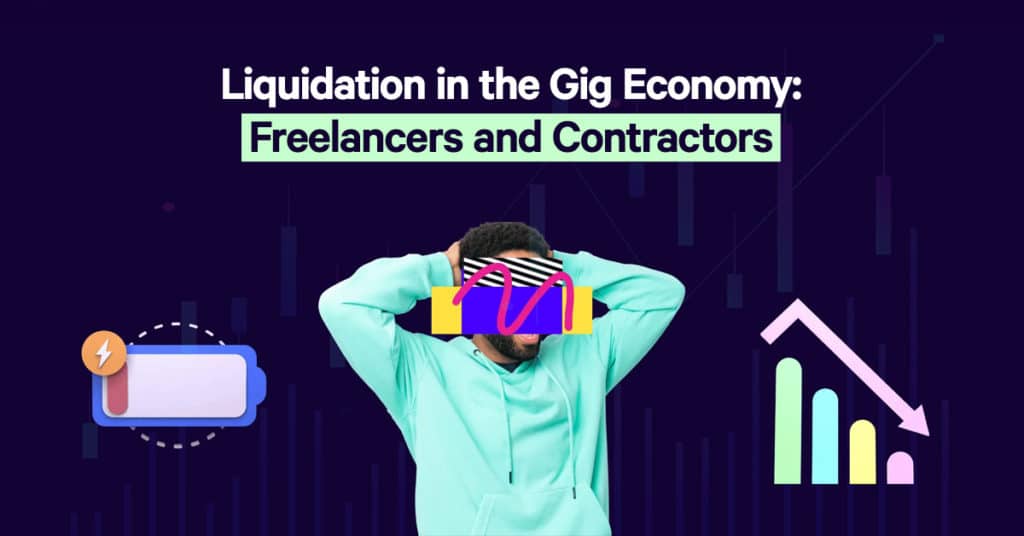The gig economy has redefined the traditional employment landscape, offering unparalleled flexibility and autonomy to workers across various sectors. However, the very nature of freelance and contract work can bring about financial uncertainty, leading to situations where the subject of liquidation rears its head. Liquidation in the gig economy isn’t just a legal process but also a matter of safeguarding the financial future of independent professionals.
Understanding Liquidation in the Gig Economy
Liquidation, in the context of the gig economy, refers to the process through which a freelancer or contractor’s business is ended by distributing its assets to claimants. It’s typically a route taken when a freelancer’s business is insolvent, meaning it can no longer meet its financial obligations as they fall due.
The Rise of Freelancers and Contractors
The UK has seen a significant rise in the number of people working as freelancers and contractors. This growth is driven by the flexibility of gig work, allowing individuals to choose when, where, and how they work. However, with this freedom also comes a lack of the security and benefits that come with traditional employment, such as sick pay, holiday pay, and pension contributions.
The Challenges of Financial Management
Financial management can be particularly challenging for gig workers. Without the certainty of a regular income, planning for taxes and managing business expenses can be overwhelming. This is where the concept of liquidation in the gig economy crops up and why gig workers must be aware of the signs of financial distress and understand their options.
Signs of Financial Distress
Freelancers and contractors should be vigilant for signs of financial distress, such as a consistent decline in work, difficulty paying bills on time or using personal funds to keep the business afloat. Recognising these signs early can be key to preventing compulsory liquidation.
Voluntary Liquidation Options
When facing financial difficulties, gig workers have the option of voluntary liquidation. This is a proactive step of wrapping up affairs while settling as many debts as possible. It’s a dignified exit strategy that can help preserve professional relationships and personal credit ratings.
The Liquidation Process
The liquidation process in the gig economy often starts with the appointment of a licensed insolvency practitioner, a specialist who orchestrates the winding-up of the business. This professional is tasked with liquidating assets, resolving any outstanding legal disputes, and distributing the resulting funds to creditors in accordance with the law.
For freelancers and contractors with no colleagues to turn to, the prospect of liquidation can be intimidating, brimming with complex procedures and legal jargon. However, with the correct expert guidance, the process can be demystified. Insolvency practitioners manage the practicalities of liquidation and provide the necessary support to navigate the process efficiently and with dignity. Their involvement makes sure that the procedure is conducted fairly, transparently, and with a focus on achieving the best possible outcome for all involved.
Impact on Future Work
One of the main concerns for gig workers considering liquidation is the impact it may have on their ability to secure future work. It’s important to note that while liquidation does carry a certain stigma, it does not signify the end of a professional journey. In fact, the marketplace often values the resilience and lessons learned through challenging experiences. Many successful entrepreneurs have not only overcome the hurdles of liquidation but have also used the experience as a catalyst for growth, forging ahead to build thriving and fruitful careers. It’s a testament to the fact that setbacks can set the stage for comebacks, and with the right mindset and strategy, liquidation can be a stepping stone to greater achievements in one’s career.
Seeking Professional Advice
Navigating liquidation in the gig economy is a challenging venture that demands professional advice. Insolvency practitioners like Simple Liquidation come with a wealth of experience and are adept at offering bespoke solutions sensitive to the specific needs of freelancers and contractors. We’re not just advisors but partners who can guide you through the intricacies of financial distress. We can evaluate your situation with a fine-toothed comb and offer invaluable insights into the most fitting strategies for your business, which may include restructuring plans, refinancing options, or the process of liquidation. This support is crucial in ensuring that any action taken complies with legal requirements while aligning with your professional goals and personal wellbeing.
The Role of Insolvency Practitioners
Insolvency practitioners are the linchpins of the liquidation process, especially within the gig economy. They have the critical responsibility of ensuring that all legal obligations are meticulously adhered to and that the interests of all stakeholders, including creditors, are equitably addressed. Their deep understanding of insolvency law and ability to navigate complex financial landscapes make their expertise indispensable. By orchestrating a structured closure, we can provide clarity and stability, transforming what could potentially be a chaotic collapse into an orderly and strategic wind-down.
Preparing for Liquidation
Preparation is key when approaching liquidation. This includes organising financial records, understanding the value of assets, and considering the implications for ongoing contracts. Freelancers and contractors should also be mindful of the emotional toll and seek support where needed.
Liquidation in the gig economy is a complex process, but it does not have to be negative. With the right advice and support, freelancers and contractors can navigate through financial difficulty and emerge in a position to rebuild. If you’re a gig worker facing financial challenges it’s crucial to act swiftly and seek expert assistance.
Support Every Step of the Way
For those in the gig economy, facing financial uncertainty need not be a journey made alone. At our leading insolvency practice, we understand the nuances of liquidation in all different circumstances and are here to offer the support and guidance you need. Contact us using the form on our website, engage with our live chat, email us directly at mail@Simpleliquidation.co.uk, or call us at 0800 246 5895. We’re here to help you find the best path forward.




